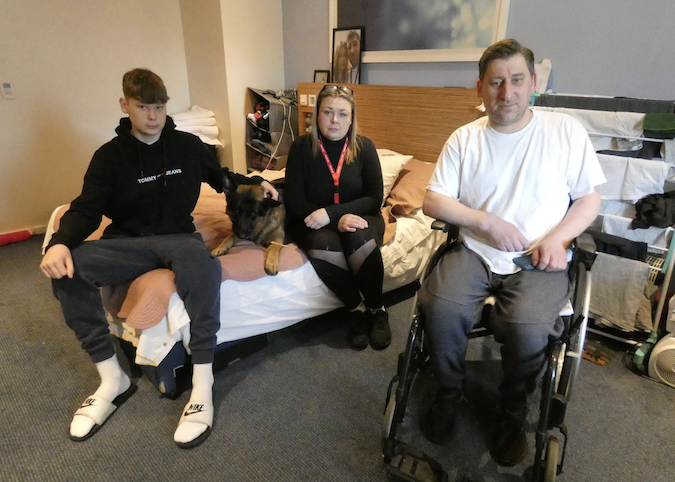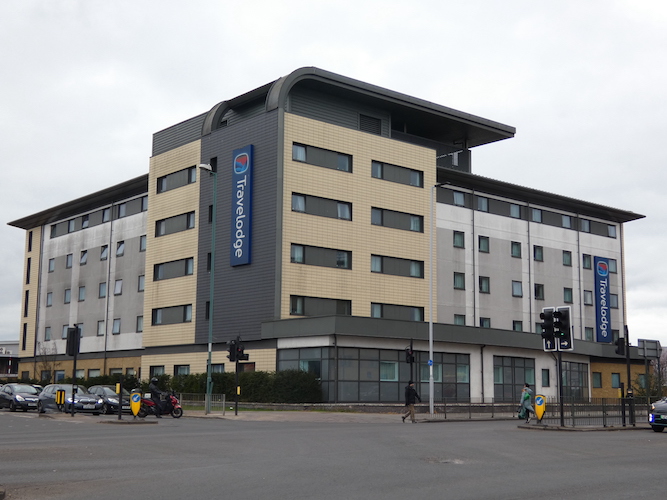Looming over a junction of the A10 dual carriageway, in the middle of the borough of Enfield, stands a Travelodge. Built 12 years ago, it is a typical budget hotel surrounded by a large car park and not much else. Its usual clientele are short-stay visitors to London looking for a bargain. But since 2022 this hotel has been occupied by families staying for far, far longer.
I first went there in March 2023. I’d been told about a homeless family – including a toddler and a pregnant, disabled mother – that had been living in the hotel for several weeks. Reza Ramazani, his wife Elnaz and their two-year-old daughter Artemis had been holed up at the Travelodge and, previously, at two other hotels for four months in total.
Reza told me they were “eating fast food everyday” as they had nowhere to cook and couldn’t afford to visit restaurants. “My daughter has nowhere to play,” he said. “There is no playground, there is nothing, and I have to stay close in case she [Elnaz] needs help.”
Elnaz had been injured in a car crash two years previously and been on crutches ever since. At the time I met her, she was six months pregnant with the couple’s second child.
Housing and homelessness are recurrent themes for local journalists like myself. Issues such as social housing waiting lists, maintenance and repairs, and temporary accommodation are probably the most important that any London council has to deal with on a daily basis. I’ve covered all of these issues regularly since I got my first job on a local paper in 2007.
But nothing quite prepared me for the Ramazani family. I cried in the car park after meeting them. Fortunately, the story I wrote for Enfield Dispatch seemed to have a positive impact – the family was moved out of the hotel and into a flat a few days later. The Ramazanis were still technically homeless and living in temporary accommodation, but the move meant they would at least have some privacy, separate bedrooms and their own cooking and washing facilities.
In local authority jargon, the term “bed and breakfast” is used to describe any emergency housing, such as hotels and hostels, used as a last resort used by councils to fulfil their legal duty to put a roof over the head of families that declare themselves homeless. In normal times, such B&Bs are an interim measure lasting a week or two until the council can find the family a dwelling – often in the private rental sector – that may still count as temporary accommodation but provides privacy and (some) security.
The government has guidance for local authorities using B&Bs. It states that such accommodation “caters for very short-term stays only” because it “affords residents limited privacy, and may lack or require sharing of important amenities”. Wherever possible, the government advises, “housing authorities should avoid using B&Bs as accommodation for homeless applicants”. There is a legal limit of six weeks for councils housing families with children in B&Bs.
Before they were moved out of Enfield Travelodge, the Ramazanis had spent 15 weeks living in hotels – nine weeks longer than the legal limit. Theirs was a shocking case but also, as I was about to discover, symptomatic of a much deeper problem.
A couple of weeks later, a meeting of Enfield Council’s housing scrutiny panel discussed the extent of the homelessness crisis facing the borough. There had been a 90 per cent decrease in the supply of affordable private rented housing. “For the first time since the post-war period, the private sector is shrinking,” an officer warned.
This was having an impact all over London, but particularly in Enfield, which had some of the highest poverty rates in the capital but a relatively small pool of social rent homes, meaning there was a heavy reliance on cheap rental properties. Now, the stock of such homes was rapidly shrinking.
A council report published in March stated that the council was housing around 200 families in hotels with a nightly cost per room of approximately £100. Monthly spending on hotels had reached £500,000 in February 2023 after soaring ten-fold in under a year.
In April, I met another family at Enfield Travelodge. The Rembikowskis (pictured below) had been made homeless due to a fire at their Palmers Green property the previous August. Since then, they hadn’t been able to find anywhere suitable that was affordable. The father of the family, Piotr was in a wheelchair. He told me: “I have no hope left […] we are stuck here.”

In June, I published data obtained under the Freedom of Information Act which showed that as of the end of March 2023, there were 113 Enfield families with children who had lived for more than six weeks in B&Bs – an increase from just one at the start of the financial year.
The council was forced to announce a new policy. It had been attempting to end the use of temporary housing placements outside of the borough, a practice for which many London local authorities have long been criticised. But given the rapid change in circumstances and escalation of homelessness, it now began to do the opposite. Families would be offered homes far beyond the borough, and even the south-east of England, as a matter of routine.
A week later I met a third Enfield family living in a hotel, this time the Finchley Travelodge. Incredibly, a mother with quadruplets had been living there for four months following a Section 21 (no-fault) eviction. The kids were restless, running in and out of the room as I interviewed mother Tracey Britten. One of them was autistic and had sometimes gone missing in the hotel after waking up in the middle of the night. Hotel doors cannot be bolted shut.
Tracey told me: “I only picked winter clothes [to bring to the hotel] because I thought there was no way they would leave me in a hotel with four kids for this long.” Thankfully, two weeks after publication of my story, they were rehoused.
By now, the council, as well as Enfield’s three local MPs, were putting pressure on the government to intervene. In July in the House of Commons, Edmonton MP Kate Osamor demanded the council be given “the resources it needs” to “end this hotels crisis”.
Levelling Up Secretary Michael Gove acknowledged there were “too many people in temporary accommodation” and said he would “look at the challenges that Enfield Council faces in terms of the delivery of housing, including affordable housing for the vulnerable families that she champions”. But no government help was forthcoming, and the crisis worsened.
In September I reported that Enfield had the highest rate of no-fault evictions in London, with new data showing 477 local families had been turfed out of their homes in the four years since the government promised to end Section 21, back in April 2019.
Ending no-fault evictions was one of three immediate steps local authorities in London were demanding of the government, the other two being a rise in the Local Housing Allowance, which sets private rented sector benefit levels, and direct financial assistance to cover the extra millions now being spent on temporary housing.
In October, I spoke again with the Rembikowskis, who had by then been living in hotels for well over a year, having moved four times. The family’s possessions had recently been disposed of by the self-storage warehouse they had been using, as they couldn’t afford to pay the bill they’d racked up. I accompanied Piotr as he turned up at Enfield Civic Centre one morning to demand answers from his housing officer. It was a depressing experience, giving me a taste of the frustrations felt by homeless families across London as they seek help from beleaguered and overworked local authority staff.
Enfield North MP Feryal Clark was the next local parliamentarian to challenge Gove in the House of Commons. She told him that her constituents, Esther and Fred, had “lost their son two weeks ago in the most horrific of circumstances” and “that very week were served a Section 21 notice, despite the landlord knowing their circumstances”. Gove said he was “deeply sorry” to hear about the case and reiterated his support for a ban on Section 21 evictions as set out in the Renters (Reform) Bill. But last October, the government announced that this reform would be indefinitely delayed.
In November, more data emerged which showed that the number of Enfield families with children being housed in B&Bs beyond the government’s six-week legal limit had hit 150. In total, there were 247 local children living in hotels.
That month, there was finally some good news, as the chancellor’s Autumn Statement included an increase in the Local Housing Allowance. But Enfield Council leader Nesil Caliskan warned it wasn’t enough, and that local authority finances were still “under immense pressure”. The council has forecast that its spending on temporary housing will exceed the budgeted amount by £20 million during the 2023/24 financial year. It’s not clear where this money will come from.
In December, five days before Christmas, I was given the phone number of another family I was told were living at Enfield Travelodge. But when I rang mum Freda she told me their situation was even worse – she and her three young children had been removed from the hotel after refusing an offer of temporary housing in Telford, 145 miles away. They spent the night in a shelter. When I spoke to Freda, they were at Edmonton Green Library waiting to call the emergency number at 5pm to be directed, hopefully, to another one.
By this time, the council’s policy was to only make one offer of temporary accommodation – no matter how suitable – before discharging its legal duty. A spokesperson explained: “The council has no option but to make a single offer of accommodation due to the severe lack of affordable accommodation. Enfield is one of many councils now making offers for homes wherever is affordable and suitable. The council continues to ask the government for a long-term solution to increase the supply of affordable housing.”
After a year of reporting on a homelessness crisis more severe than anything seen in this country for at least a generation, I still don’t think the gravity of the situation has been recognised by either the government or the opposition. It remains to be seen whether it becomes a top issue during the general election campaign to come. In the meantime, thousands of families across London continue to live in hotels like the Travelodge on the A10, for weeks and months on end.
James Cracknell is editor of the Enfield Dispatch. He took all the photographs accompanying this article. Follow James on X/Twitter. Support OnLondon.co.uk and its writers for just £5 a month of £50 a year and get things for your money too. Details HERE.

